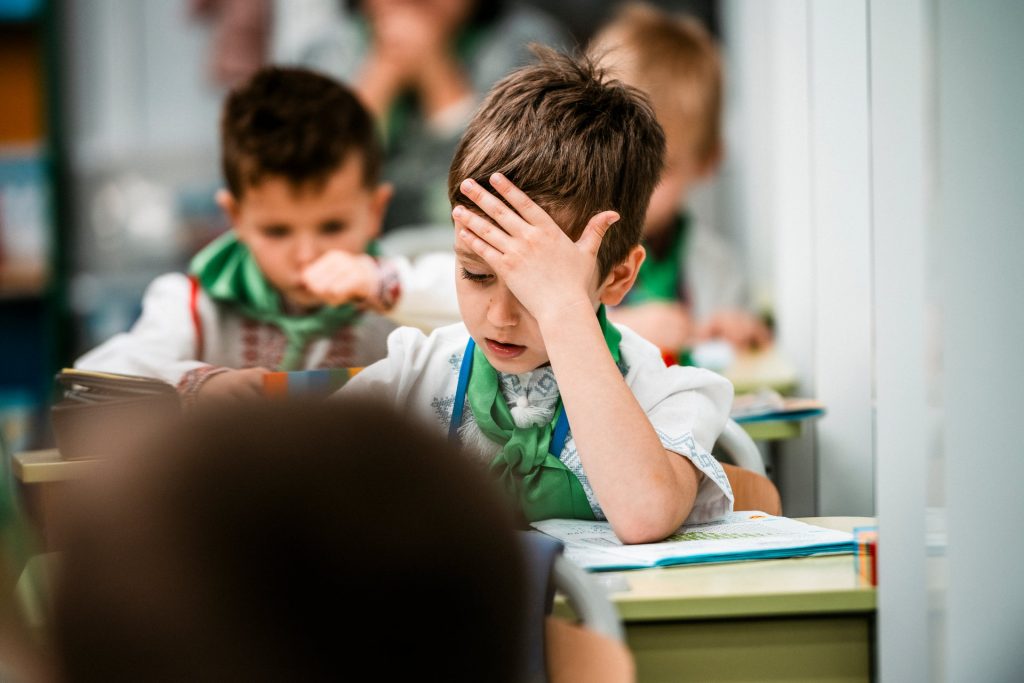FCA is strengthening children’s mental health and resilience in Ukraine

“Psychosocial support is not a luxury, but a lifeline for teachers, children, and families living with the realities of war,” said Patricia Maruschak, Country Director of Finn Church Aid (FCA) in Ukraine, as the organisation released new independent findings on its work.
Kyiv, Ukraine, 10 October 2025
A COMPREHENSIVE IMPACT ASSESSMENT conducted in Chernihiv, Kharkiv and Kyiv shows that FCA’s psychosocial support programmes have significantly improved mental health, coping skills, and resilience across schools and communities during the ongoing conflict.
As Ukraine continues to endure the devastating impacts of war, the new evaluation highlights the vital role of psychosocial support (PSS) in strengthening wellbeing and equipping teachers, children, and families with tools to navigate trauma.
10 million likely to develop a mental health condition
The scale of need is overwhelming: humanitarian partners estimate that nearly 10 million people in Ukraine – including 1.4 million children – are likely to develop a mental health condition, with 3.9 million expected to experience moderate or severe conditions . Against this backdrop, FCA’s interventions provide vital tools and safe spaces for communities to cope with trauma and rebuild resilience.
Through support such as safe spaces for children, teacher wellbeing and training, and art therapy, FCA has contributed to protecting mental health and fostering resilience in conflict-affected communities.
Commissioned by Finn Church Aid (FCA) and conducted by Middle East Consulting Solutions (MECS), the Comprehensive Impact Assessment of Psychosocial Support Activities in Ukraine reviewed FCA’s education-linked PSS interventions implemented since 2022. The portfolio includes safe spaces for children, teacher wellbeing cycles, Psychological First Aid (PFA), Social and Emotional Learning (SEL) training, and additional initiatives such as KOLO Clubs and Art Therapy, including the DG ECHO-funded “Safe Return to Education” programme
Key findings
- Children’s outcomes: 92% of children described PSS activities as useful and important, highlighting art therapy, theatre/creative expression, first aid, mine safety, and mindfulness/relaxation among the most valuable elements.
- Teachers’ resilience and classroom support: 94% of teachers reported strong positive effects on their own mental health, improved crisis response, and enhanced ability to support students during alerts and evacuations; training boosted emotional support, de-escalation and communication skills.
- Caregivers’ observations: Parents most frequently reported improved social interaction (83%), reduced stress/anxiety/PTSD symptoms (71%), and better concentration/academic focus among children.
- Adults’ coping: 98.5% of adult participants adopted positive coping mechanisms (e.g., relaxation, problem-solving, constructive emotional expression).
“After completing the course, we felt as if we were beginning to come alive again, with better morale,” a teacher from Chernihiv said.
“We explored and portrayed different emotions, and through this we discovered more about ourselves,” noted a 12-year-old theatre participant.
Addressing gaps
While overall relevance and effectiveness were high, the assessment points to the need for more on-site psychologists, stronger outreach in rural areas, longer-term follow-up and supervision, and continued adaptation for online or disrupted schooling in high-risk settings .
“Our priority is to build on these lessons, ensuring accessible, sustainable, and inclusive psychosocial support across Ukraine,” said Patricia Maruschak, Country Director, FCA Ukraine.
Psychologists involved in the programmes also stressed the importance of continuous support and supervision for teachers and caregivers, noting that their sustained wellbeing is essential to ensure consistent, high-quality psychosocial support for children.
“When teachers and caregivers feel supported themselves, they are far better equipped to recognise distress in children and respond in ways that truly help,” said Liudmyla Kiian, MHPSS Coordinator at FCA Ukraine. “Ongoing support and professional mentoring are not optional extras – they are essential if we want children to receive consistent, high-quality care in such challenging circumstances.”
This assessment underscores the urgency of sustained investment in psychosocial support for communities living under the shadow of war. Finn Church Aid, including through the DG ECHO-funded Safe Return to Education programme and in collaboration with partners, remains committed to ensuring that children, teachers and families across Ukraine have access to safe spaces, practical coping tools and the resilience needed to look to the future with hope.
You can read the full assessment on ReliefWeb here: https://reliefweb.int/report/ukraine/comprehensive-impact-assessment-psychosocial-support-activities-ukraine-during-escalated-conflict-2022-15-jan-2025
—
This press release was published to coincide with World Mental Health Day, 10 October 2025.
For more information or interview requests:
Contact in Ukraine:
Veronika Korobko, Communications Coordinator, Finn Church Aid – Ukraine
Email: veronika.korobko@kua.fi
Contact for international journalists:
Ruth Owen, Manager, Global Communications, Finn Church Aid – Finland
Email: ruth.owen@kua.fi